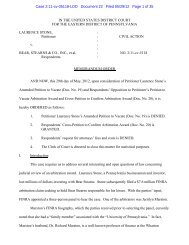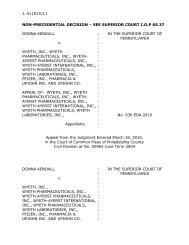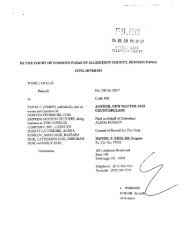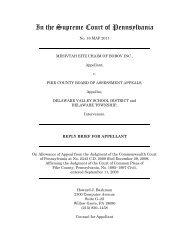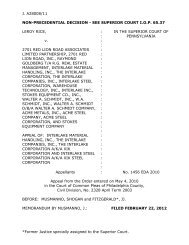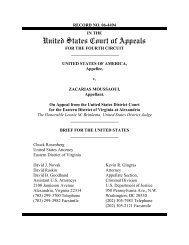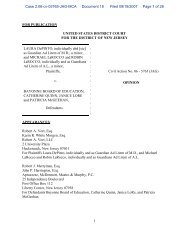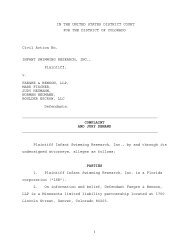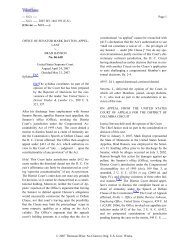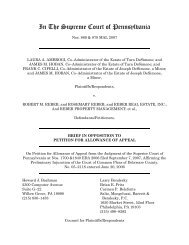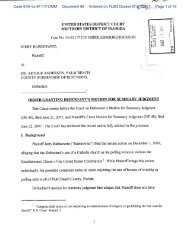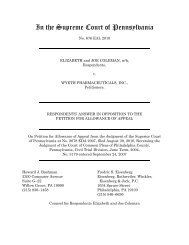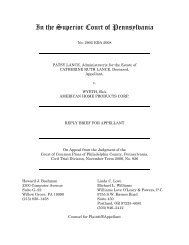petition for rehearing en banc - How Appealing
petition for rehearing en banc - How Appealing
petition for rehearing en banc - How Appealing
You also want an ePaper? Increase the reach of your titles
YUMPU automatically turns print PDFs into web optimized ePapers that Google loves.
Because the obstruction count was focused on this flawed prosecution, the jury’s under-<br />
standing as to what the crime was that Black might be seeking to obstruct was crucial to its<br />
assessm<strong>en</strong>t of the plausibility of the governm<strong>en</strong>t’s corrupt-int<strong>en</strong>t theory. In assessing what<br />
sort of future criminal prosecution Black might have contemplated and sought to obstruct,<br />
the erroneous instructions on honest services fraud would naturally sway the jury toward<br />
conviction. It is no answer to say, as the panel reasoned, that the th<strong>en</strong>-p<strong>en</strong>ding investigation<br />
(and ultimate criminal indictm<strong>en</strong>t) also embraced pecuniary fraud, which of course is a real<br />
crime. Slip op. at 6-7. That might suggest that a proper obstruction charge could have be<strong>en</strong><br />
framed on that basis, but it does not show that this jury found obstruction on a proper basis.<br />
Wh<strong>en</strong> a jury may have rested its verdict on an erroneous view of the law, it is never a good<br />
answer to say that the jury had available other legally sound theories on which the verdict<br />
might well have rested. Compare Yates v. United States, 354 U.S. 298, 311-12 (1957), and<br />
Bachellar v. Maryland, 397 U.S. 564, 569-72 (1970), with Griffin v. United States, 502 U.S.<br />
46, 59 (1991). At a minimum, the instructional error—which told the jury that a vast range<br />
of conduct involving fiduciary nondisclosure was criminal—very likely affected the jury’s<br />
assessm<strong>en</strong>t of the plausibility of the governm<strong>en</strong>t’s claim that Black was attempting corruptly<br />
to obstruct his criminal investigation or prosecution. The governm<strong>en</strong>t cannot reasonably<br />
posit that the jury in this case would have be<strong>en</strong> indiffer<strong>en</strong>t to the fact that the “crime” that the<br />
governm<strong>en</strong>t primarily urged upon the jury—those “two words” that the prosecutor wanted<br />
the jury to remember as the fraud in this case—was not a federal crime at all.<br />
eral prosecutor, that a grand jury investigation and a federal criminal investigation are pretty much<br />
one and the same, correct?”); id. at 11423-24 (AUSA asking whether Black had by th<strong>en</strong> “hired<br />
criminal lawyers from Williams & Connolly,” including “famous criminal lawyer[s]” Br<strong>en</strong>dan Sullivan<br />
and Greg Craig, who had respectively repres<strong>en</strong>ted “Oliver North” and <strong>for</strong>mer “Presid<strong>en</strong>t Clinton”);<br />
id. at 12500-07 (AUSA attempting repeatedly, in the face of multiple objections, to establish<br />
that Br<strong>en</strong>dan Sullivan and Greg Craig are “famous” criminal attorneys, and that Sullivan repres<strong>en</strong>ted<br />
“Oliver North”); id. at 11481-82 (eliciting that Maida was not aware of a SEC investigation but that<br />
it was “g<strong>en</strong>eral knowledge” and “everybody knew” there was a criminal investigation).<br />
14



